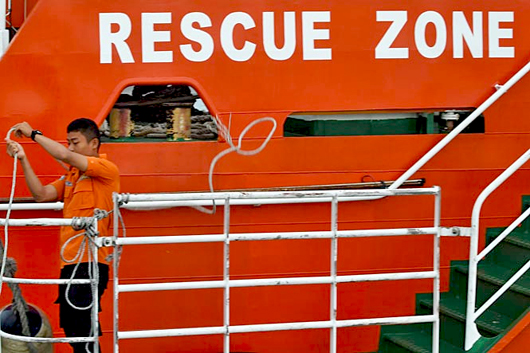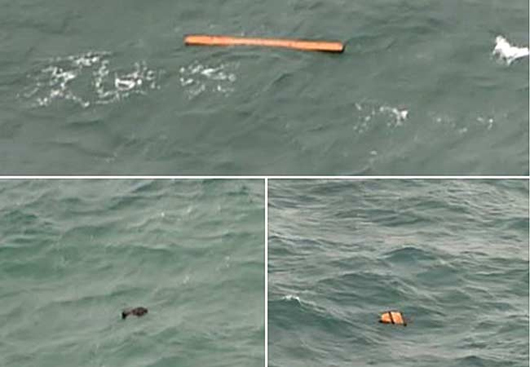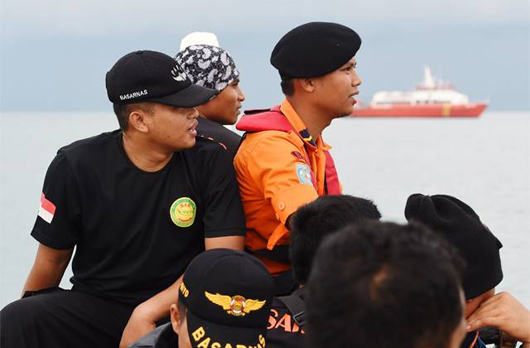Jakarta, Dec 30: Debris spotted Tuesday during an aerial search for AirAsia flight QZ8501 is from the missing plane, Indonesia's director general of civil aviation said.
"For the time being it can be confirmed that it's the AirAsia plane and the transport minister will depart soon to Pangkalan Bun," Djoko Murjatmodjo said.
"Based on the observation by search and rescue personnel, significant things have been found such as a passenger door and cargo door. It's in the sea, 100 miles (160 kilometres) southwest of Pangkalan Bun," he said, referring to the town in Central Kalimantan, on the island of Borneo.
Indonesian officials coming off a helicopter in Pangkalan Bun said they spotted several bodies floating in waters near where the missing AirAsia flight was last seen.
Images on local television showed at least one bloated corpse.
The bodies, swollen but intact, were brought to an Indonesian navy ship, National Search and Rescue Director SB Supriyadi told reporters. The corpses did not have life jackets on.
An air force plane also spotted a "shadow" on the seabed believed to be the missing AirAsia jet, Indonesia's National Search and Rescue Agency chief said.
"God blessed us today," Bambang Soelistyo told a press conference.
"At 12:50 the air force Hercules found an object described as a shadow at the bottom of the sea in the form of a plane."
Navy spokesperson said several victims were found, but he did not indicate whether they were dead or alive. Air Force spokesperson Hadi Tjahjanto told MetroTV at least one body was found.
An Indonesian military aircraft first saw white, red and black objects, including what appears to be a life jacket.
Indonesian air force official Agus Dwi Putranto told reporters that they spotted about 10 big objects and many more small white-coloured objects.
"The position is 10 kilometres (six miles) from the location the plane was last captured by radar," he said.
Putranto displayed 10 photos of objects resembling a plane door, emergency slide, and a square box-like object.
The Java Sea is relatively shallow, making it easier to spot wreckage in the water, say oceanographers.
"The lesson that should be learned from MH370 is that you need to move quickly," said Charitha Pattiaratchi, an oceanographer at the University of Western Australia, referring to the Malaysia Airlines flight that went missing on March 8 during a trip from Kuala Lumpur to Beijing with 239 passengers and crew, and which has not been found.
About 30 ships and 21 aircraft from Indonesia, Australia, Malaysia, Singapore and South Korea were part of the search that spread across 10,000 square nautical miles.
AirAsia's flight QZ8501 went missing Sunday during a trip from Surabaya to Singapore, minutes after pilots had sought permission from Indonesian air traffic control to ascend to avoid clouds.
Online discussion among pilots has centred on unconfirmed secondary radar data from Malaysia that suggested the aircraft was climbing at a speed of 353 knots, about 100 knots too slow, and that it might have stalled.
The plane, whose engines were made by CFM International, co-owned by General Electric and Safran of France, lacked real-time engine diagnostics or monitoring.
On board Flight QZ8501 were 155 Indonesians, three South Koreans, and one person each from Singapore, Malaysia and Britain. The co-pilot was French.
Indonesia AirAsia is 49% owned by Malaysia-based budget carrier AirAsia.
The AirAsia group, including affiliates in Thailand, the Philippines and India, had not suffered a crash since its Malaysian budget operations began in 2002.
The plane's crash comes at a sensitive time for Indonesia's aviation authorities, as they strive to improve the country's safety reputation to match its status as one of the airline industry's fastest growing markets.
Could plane have stalled?
Flight QZ8501 had sought permission from Indonesian air traffic control to ascend to avoid clouds just before it went missing.
US law enforcement and security officials said passenger and crew lists were being examined but nothing significant had turned up and the incident was regarded as an unexplained accident.
The plane, which did not issue a distress signal, disappeared after its pilot failed to get permission to fly higher because of heavy air traffic, officials said.
Pilots and aviation experts said thunderstorms, and requests to gain altitude to avoid them, were not unusual in that area.
The Indonesian pilot was experienced and the plane last underwent maintenance in mid-November, the airline said.
CEO expresses grief
AirAsia chief executive Tony Fernandes expressed his grief to the relatives of the 162 passengers and crew on board.
"My heart is filled with sadness for all the families involved in QZ 8501. On behalf of AirAsia my condolences to all. Words cannot express how sorry I am," he wrote on Twitter, adding that he was rushing to Surabaya in Indonesia where the plane took off on Sunday and relatives have gathered.








Comments
Add new comment